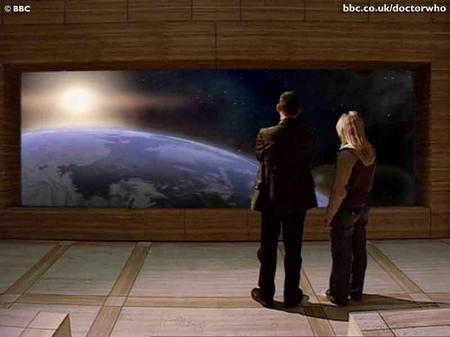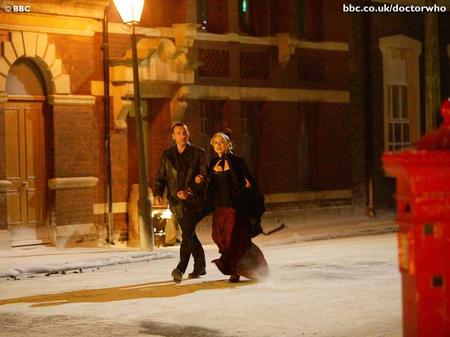April 09, 2005
Is it easier to imagine the end of the world than the end of capitalism?
Well, I must say that the second and third adventures have been quite delightful.
If 'Rose' had all the features of a Dr Who episode I should have loved, 'The End of the World' had all the Fantasy trappings I instinctively dislike - spaceships, blue-coloured aliens etc - but Russell T Davies' script was so witty and thoughtful that any misgivings were swept away from the first minute. Davies showed once again that it is possible to send up SF conventions without ending up in PoMo irony: queering rather than queening you might say.
The template for 'The End of the World' was clearly 1972's 'Curse of Peladon', in which Pertwee encountered a menagerie of aliens convening on a medieval planet for an inter-species conference. The allusion in 1972 was to the UK entry into the EEC; Davies' target in 2005 was consumerism, celebrity and cosmetic surgery. Bat emailed me with some fascinating analysis:
'the plot basically involves the world ending, with the "great and the good" - ie filthy rich - looking on [yes, it was like Nova Express crossed with The Society of the Spectacle - m k-p]. The future society is depicted as thoroughly hierarchical and deferential, and the murder mystery plot revolves around shares and money.
Which of course perfectly fits Zizek's pronouncement a couple of years ago that we find it easier to imagine the world ending than a change in the political system:
"In the last thirty years, we are again accepting the notion of history as fate. Thirty or forty years ago, there were still debates about what the future will be - Communism, socialism, fascism, liberal capitalism, totalitarian bureaucratic capitalism. The idea was that life would somehow go on on earth, but that there are different possibilities."
"Now we talk all the time about the end of the world, but it is much easier for us to imagine the end of the world than a small change in the political system. Life on earth maybe will end, but somehow capitalism will go on."'
Actually, I was reminded of Zizek's insistent refrain that, for a true philosopher, everything has already happened. Rose (Billie Piper quite superb again) in effect attains that philosophical wisdom during the episode. Davies managed to make the scene in which she talked to her mum across time with a mobile phone hastily 'jiggery-pokered' by the Doctor by turns funny, sad and genuinely philosophical. Rose in effect flips from immersion in 'lived duration' to the perspective of Eternity, which is to say, she attains a detachment from any particular pathological 'horizon'. She sees that not only her own organism, but her species and planet are ephemeral. All of which put me in mind of Lyotard's essay in The Inhuman 'Can Thought Go on without a Body?' and Ray's brilliant radicalization of it in his 'Solar Catastrophism'. As Ray writes:
'Lyotard’s question, ‘can thought go on without a body?’ ... [raises one that is] more fundamental, although it only warrants a passing mention by Lyotard. This other question is: can thought go on without a horizon? The use of the word ‘horizon’ here is intended to bear a quasi-transcendental charge. For European philosophy up to and including Nietzsche—I say ‘including’ because I fear Nietzsche ultimately remains a Christian thinker—the name for the horizon was ‘God’. Then, in the wake of the collapse of this first horizon, for a central strain in European philosophy since Nietzsche, whose most significant representatives include figures as diverse as Husserl, Heidegger and Deleuze, the name for the horizon becomes ‘Earth’. My aim here is to show that this horizon too needs to be wiped away.
Thus, the link between Lyotard’s question, “can thought go on without a body?”, and my question “can thought go on without a horizon?”, is provided by an intermediary question: “what happens to thought when the earth dies?”. Significantly, this is the question with which Lyotard’s essay begins. Roughly 4.5 billion years from now, Lyotard reminds us, the sun will explode, destroying the earth and all earthly life. Thought’s terrestrial horizon will be wiped away. This is the solar catastrophe, in the original Greek sense of the word as a ‘mis-turning’ or ‘over-turning’ (kata-strophe). The death of the sun is a catastrophe because it overturns the terrestrial horizon relative to which philosophical thought orients itself. Or as Lyotard himself puts it: “[E]verything’s dead already if this infinite reserve from which [philosophy] now draws energy to defer answers, if in short thought as quest, dies out with the sun.” Everything is dead already. The catastrophe has already happened. Solar death is catastrophic because it vitiates philosophical temporality, thought’s constitutive horizonal relation to the future. Far from lying in wait in for us in the far distant future, on the other side of the terrestrial horizon, the solar catastrophe needs to be grasped as the aboriginal trauma driving the history of terrestrial life and terrestrial philosophy as an elaborately circuitous detour from stellar death. Terrestrial history occurs between the simultaneous strophes of a death which is at once earlier than the birth of the first unicellular organism and later than the extinction of the last multi-cellular animal. Paraphrasing a remark Freud makes in Beyond the Pleasure Principle, we could say this: “In the last resort, what has left its mark on the development of [philosophy] must be the history of the earth we live in and of its relation to the sun.” This mark, this trace imprinted upon thought by its relation to the sun, is the trace of the solar catastrophe, which both precedes and follows, initiates and terminates, the possibility of philosophisable death.'
The 'excarnate thought' Ray posits at the end of the essay is as far from the 'lived body' hymmed by contemporary theory (the word 'body' almost invariably means 'organism' in such cult studs of course).
The philosophical import of the episode's revelation was literally unhomely, in that, although the Doctor asks Rose if she would like to go home, it is clear that there is no home for to go to, and never was. For Rose, indeed, Everything is dead already. When she and the Doctor return to earth, the bathetic note struck when they seek out a bag of chips does not dispell the uncanniness of the scene, in fact it underscores it: the people, the business, the crowds now look like ghosts of themselves, which of course they are. 'You only have a lifetime to escape', as I put it in londonunderlondon.
The Eccleston Doctor's bipolar lurching from impish playfulness to sullen melancholy was given a motivation that added to the thematic richness of this particular adventure, whilst setting up an intriguing story arc. The hints about a Galifreyan genocide ('There was a war. We lost') gave the Nietzschean theme of the Last Man another dimension. Both the Doctor and Rose have seen their worlds destroyed, both have experienced themselves as the 'last' of their people. And the challenge they both face - the Doctor dealing with it by such a passion for activity that he does not have time to be sucked into depressive pathos - is the one Nietzsche understood very well: to face the radical contingency/ ephemerality of all 'horizons' and yet remain committed, engaged. If, as Ray rightly argues, Nietzsche ultimately fails in this, it is nevertheless the very basis of Spinoza's Ethics.
The Doctor's line 'everything dies', and his allowing of the Dorian Gray-like Cassandra to disintegrate, like Poe's Waldemar, into long overdue death couldn't have been more timely, what with the Terri Schiavo nonsense...
(All this and Britney Spears too! (Though there is a possibility of a continuity error in the implied reference to a 'Toxic' 7" single release.)
Tonight's episode, 'The Unquiet Dead', written by League of Gentlemen's Who-enthusiast Mark Gatiss, was a return to the classic Gothic mode perfected during Philip Hinchcliffe's tenure on the programme in the late 70s. The story it most resembled though was one aired just after Hinchcliffe had left, Horror of Fang Rock - the same powerful use of a confined space (a Victorian morgue in 'The Unquiet Dead'; a lighthouse in 'Fang Rock'), the same Sapphire and Steel-like revelation that the apparently supernatural is in fact alien. It was not so much steampunk as gaspunk, the literally ethereal aliens taking advantage of the Victorians' method of lighting. Gatiss made excellent use of the period mummery, all the accoutrements of seances and mediums, and Simon Callow was suitably histrionic as the defeated and depressed older Dickens, reduced to performing the same old dramatic turns over and over again before being shaken out of his empiricst scepticism by an encounter with 'The Blue Elementals'.
Fabulous. (Btw I liked the description of Eccleston's Doctor as the Autistic Doctor on David Golding's Weblog, that seems to fit).
Posted by mark at April 9, 2005 09:18 PM | TrackBack
